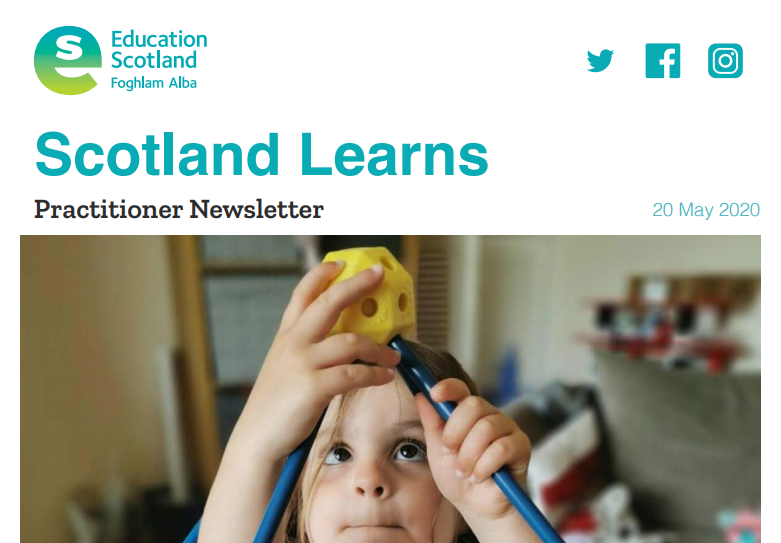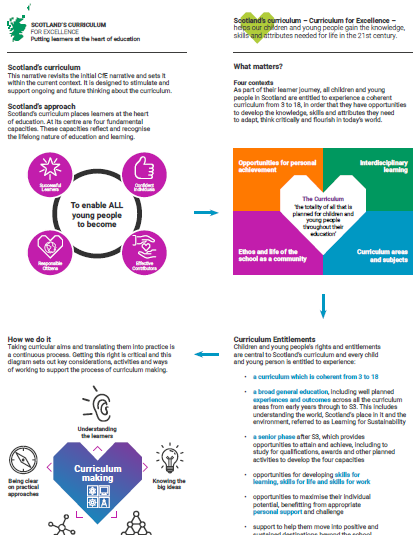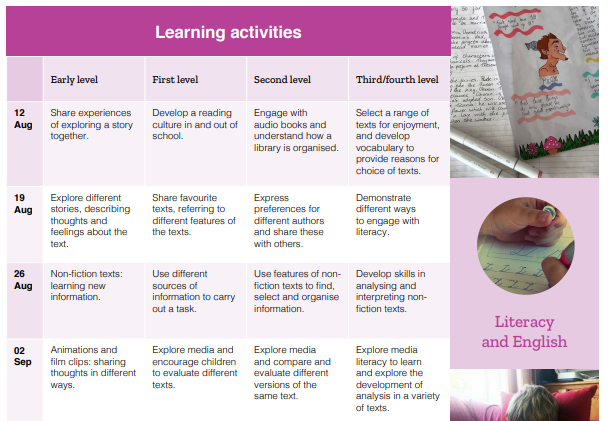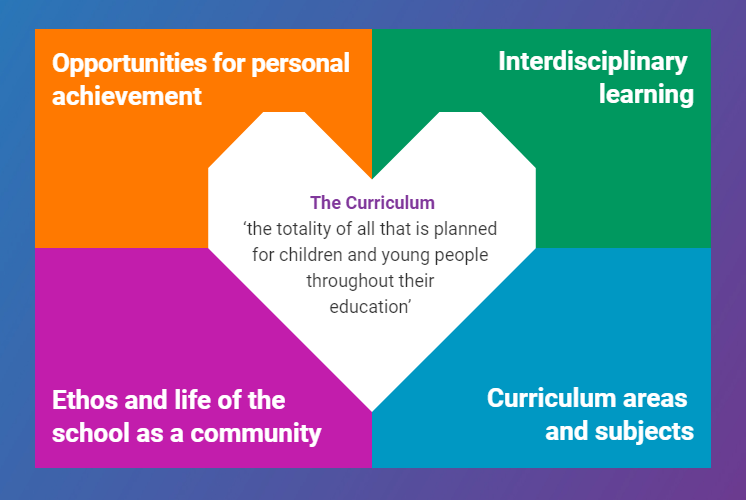
Education Scotland’s weekly news letters for practitioners and for parents/carers have been offering support with the planning of learning across the curriculum since early May and all issues can be found in the Scotland Learns section of our National Improvement Hub here (this alternative link is provided for your convenience as it takes you to the page where the activities are collated into subject areas such as literacy, numeracy, etc ).

The refreshed curriculum narrative was created with and by educators in response to OECD review of Scotland’s progress regarding CfE; it was presented to the education community in September 2019 and can be found here. Examples of good practice and professional learning materials relating to the refreshed narrative of Curriculum for Excellence can be found by clicking here. Many of these show how schools kept sight of the design of their curriculum during lockdown by capturing how their learning grids and blended approaches addressed the four contexts of the curriculum.

Education Scotland colleagues have created curriculum planning support suggestions for August to October 2020 for literacy (see photo above), numeracy, health and well being and cross-curricular studies – click here to view the Scotland Learns document. These take the form of a loose outline or learning focus so that practitioners and pupils can plan responsively for their particular context. A cross-curricular outline using the theme of Thriving offers a context which works across levels to enable practitioners and pupils to engage with the impact of Covid 19 on us and our society to date. This context or topic could be a useful curriculum design starting point during the first few weeks of schooling.

A link in the Scotland Learns document alerts us to a 2020-21 re-focus on Interdisciplinary Learning (click to visit this page) which was partially inspired by “Pillars, Lintels and Foundations; a conference paper”. This paper used a metaphor for IDL, seeing it as the lintel which rested upon the pillars of disciplinary learning and the foundations of “routine competences, aptitudes, knowledge, skills and methods in and across subjects, including basic literacy and numeracy” (click here to view the whole paper). The concluding paragraph which provides the rational for this re-focus is shared below:
Conclusions
The majority of learners would appear to progress through most or all of their education
without actively engaging in IDL, yet most jobs, even at graduate level, seldom require a
background or qualification in any particular discipline. The transferable and higher-order skills that learners acquire throughout their education may be of more lasting importance. A systemic response to this challenge is required since the jobs of the 21st century will be
increasingly project-driven rather than discipline-driven and will require the collaborative
engagement of generalists and specialists. Understanding a complex and rapidly changing
world requires a wide range of knowledge and an interdisciplinary perspective. It is, therefore, a responsibility of educators to try to ensure that learners become adept in both disciplinary and interdisciplinary learning.
We are advised that this session Education Scotland will be developing the following IDL opportunities:
- Thriving in challenging circumstances with reference to current issues of COVID-19;
- Creative Bravery with an opportunity to join the Creative Bravery Festival which will run from 21-27 September, 2020;
- Scotland’s Culture with a focus on creativity and the arts;
- Sustainability with a focus on Learning for sustainability.
Webinars and resources are being planned to support the IDL opportunities above.
At an appropriate point during this new session, Yvonne McBlain, education support officer with Falkirk Children’s Services will contact all Falkirk establishments to connect with senior leaders and practitioners interested in engaging with these developments. Together they will explore how these can inform and support our ongoing curriculum planning and design. Contact yvonne.mcblain@falkirk.gov.uk if you are interested in being part of this work.

Yvonne and Jane Jackson, outdoor learning support officer, have already looked at interdisciplinary learning within the Learning for Sustainability focus – find out more by viewing our Sway here.
The Learning Online guidance on was also produced by Education Scotland (click here to view) and may still prove to be a very useful blended learning pedagogical support – particularly for the first few weeks of our new school session. All Education Scotland guidance for online learning can be found by clicking this link.

